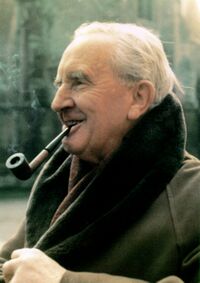J. R. R. Tolkien

Jolkien Rolkien Rolkien Tolkien John Ronald Reuel "Tollers" Tolkien is the author of several books which practically started the genre of high fantasy in the 20th century alongside his buddy, C. S. Lewis. While Tolkien lifted his material heavily from Germanic (particularly Nordic and Anglo-Saxon), Celtic and Finnish folklore, the stereotypes that he established last to this day, especially in fantasy gaming. It is probable that without his works the hobbies of roleplaying and fantasy gaming would not exist today as they do, along with a shitload of bad fantasy novels written by talentless hacks trying to emulate his works (admittedly they would have just ripped off someone else if Tolkien had not existed, like they do with Robert Howard). He also has the honour of being the man with the most hardcore, faithful and uncompromising following.
The most well-known works by Tolkien include:
- The Hobbit
- The Lord of the Rings
- The Silmarillion (published after his death by his son)
As an Oxford don, Tollers translated Beowulf and did a lot of philology on AngloSaxon and Celtic language and culture. He also wrote a Kullervo for the Finns and for any non-Finns who understandably wondered whatever Túrin was doing nuts-deep in his own sister.
One of the main themes of The Lord of The Rings, and Tolkien's miscellaneous writings, is industry vs. nature, with industrialists being portrayed as a bunch of greedy pricks (e.g. Saruman) and rural types being portrayed as decent, "salt-of-the-Earth" people (e.g. Samwise Gamgee). This is not without good reason, mind you. The man fought in World War 1, where fully industrialised armies with machine guns, artillery, and mustard gas combined into an experience that can easily be likened to a sojourn in Hell. Almost all of his friends died, Europe as a whole lost almost an entire generation (20 years!) of men in that conflict, and that's just the base of the proverbial mountain of nightmares WW1 created.
He was a giant romantic (see Beren and Lúthien and how he met his wife), cool as hell, awesome (notably telling off Nazis by explaining to them that their whole 'Aryan' thing was a crock) and that was pretty much the way most people were back then. Every inch a scholar and a gentleman.
Tolkien was also big on pipe smoking. His favourite pastime could be felt in his books, where pipe smoking among various characters is described in a colourful detail. In every situation, where characters were relaxing or having fun, they were no doubt pulling away on a finely-crafted smoking pipe.
About his writing[edit]
Tolkien liked to take his sweet time with things, establishing the environment, and the people in the general environs, to which end he'd go off on tangents. This can either be a blessing (bringing up details about the world he has created and helping immerse yourself in it) or a hindrance (bringing the story to a standstill) depending on how you view it or where you are in the story. Characterisation for non hobbits is usually fairly simplistic mythic archetypes. Aragorn does not fret much over daddy issues nor is Gimli consumed by existential angst. Even with the Hobbits the characterization while more fleshed out is usually direct and laid plain.
These characters do have inner worlds, and they do psychologically react to what is going on around them in ways informed by their cultural and personal histories, to the point that they are not one or two dimensional characters, but they are also equally not products of a style of storytelling that exalts personal psychodrama to a degree beyond Shakespeare.
Tolkien did not write to preach or expound his beliefs. He did so because he wanted to tell stories based around the worldbuilding that was his hobby. In his own words...
- “I cordially dislike allegory in all its manifestations, and always have done so since I grew old and wary enough to detect its presence. I much prefer history – true or feigned– with its varied applicability to the thought and experience of readers. I think that many confuse applicability with allegory, but the one resides in the freedom of the reader, and the other in the purposed domination of the author.”
A few of his opinions, preferences and worldviews did get worked in and are presented - broad environmentalism, a love for the English countryside, a disdain for militarism and rampant industrialisation and some old fashioned monarchism - but not to the point where you can call it propaganda by any reasonable definition. If you had to rank him on the propaganda-o-meter with one being Dan the Dog Finds a Frog and ten being Atlas Shrugged he's a three, tops.
See Also[edit]
- Middle Earth
- Mordor
- Hobbits
- Halflings
- Orcs
- Ainur
- Tom Bombadil
- Hell, Elves, Dwarfs, and Goblins all existed before Tolkien, but all post-Tolkien elves, dwarves, and goblins are either derivative of or a reaction to his.
- Eldar (considering, you know, he created the word.)
- The Poetic Edda (The book which greatly inspired him.)
- Wikipedia Article on J. R. R. Tolkien